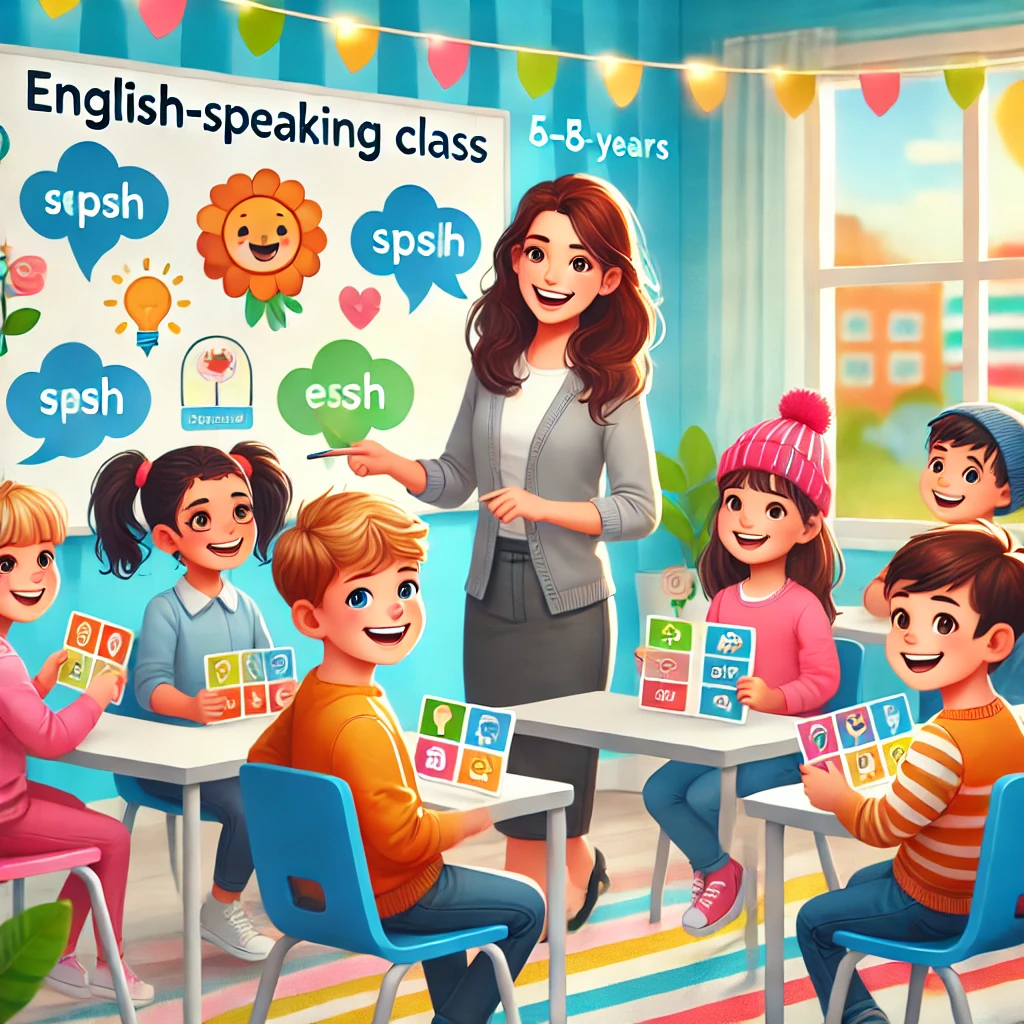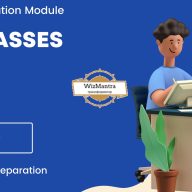English Speaking Classes for Kids: Benefits, Tips & How to Choose the Best Course
English Speaking Classes for Kids: Benefits and How to Choose the Right Course
In today’s interconnected world, proficiency in English is not just an advantage—it’s a necessity. As parents, we all want our children to excel academically and socially, and learning English at an early age can play a crucial role. English-speaking classes for kids offer tailored solutions to help children develop language skills in a structured and interactive way.
This blog will guide you through the key benefits of English-speaking classes for kids, tips for selecting the best course, and how to support your child’s journey toward English fluency.
Table of Contents
- Why Are English Speaking Classes Important for Kids?
- Benefits of English Classes for Kids
- How to Choose the Right English Speaking Course
- Key Features to Look For in a Kids’ English Program
- Online vs. Offline Classes: Which One is Better?
- How to Support Your Child in Learning English
- FAQs About English Speaking Classes for Kids
1. Why Are English Speaking Classes Important for Kids?
Language learning is most effective during childhood. Research shows that children have an innate ability to absorb new languages, making it easier for them to learn pronunciation, vocabulary, and grammar.
Reasons to Start Early:
- Global Opportunities: English is the international language of business, science, and technology.
- Cognitive Development: Learning a second language enhances critical thinking, creativity, and problem-solving skills.
- Confidence Building: Being fluent in English empowers kids to communicate effectively in diverse settings.
2. Benefits of English Classes for Kids
Enrolling your child in an English-speaking course provides multiple advantages, not only academically but also socially.
a. Improved Communication Skills
Structured lessons help kids articulate their thoughts clearly and confidently. They learn to express themselves in conversations, presentations, and storytelling.
b. Enhanced Academic Performance
A strong grasp of English improves comprehension in subjects like science, mathematics, and literature, as these often require English proficiency.
c. Early Exposure to Diverse Cultures
Learning English often involves exposure to global cultures through stories, songs, and games, fostering a broader worldview.
d. Better Social Interactions
Fluency in English allows children to connect with peers, participate in group activities, and build friendships beyond language barriers.
e. Boosted Career Prospects
Starting young gives kids a head start in mastering a skill that will be invaluable in their future professional lives.
3. How to Choose the Right English Speaking Course
Selecting the right course is crucial for your child’s success. Here are steps to guide you:
a. Understand Your Child’s Needs
Every child has a unique learning style. Determine whether your child learns better through visuals, games, or direct instruction.
b. Check the Course Curriculum
A good course should cover:
- Vocabulary building
- Sentence formation
- Pronunciation and accent training
- Speaking, listening, and comprehension
c. Assess Class Size and Interaction
Smaller class sizes ensure personalized attention, which is critical for children. Look for programs with interactive sessions to keep kids engaged.
d. Evaluate the Instructor’s Qualifications
Choose courses led by certified instructors experienced in teaching kids. They should be patient, approachable, and creative.
e. Consider Flexibility and Convenience
For busy families, online classes might be a better option due to their flexibility. Offline classes, on the other hand, offer face-to-face interaction.
4. Key Features to Look For in a Kids’ English Program
When choosing an English-speaking class, prioritize programs that include these features:
a. Fun and Interactive Activities
Games, storytelling, and role-playing make learning enjoyable for kids.
b. Progress Tracking
Regular assessments and feedback help parents monitor their child’s improvement.
c. Age-Appropriate Content
Ensure the course material is tailored to your child’s age group for better understanding and retention.
d. Cultural Immersion
Programs that integrate cultural elements, such as festivals or global traditions, make learning more engaging.
e. Parental Involvement
Choose a program that encourages parents to participate in their child’s learning journey.
5. Online vs. Offline Classes: Which One is Better?
Both online and offline classes have their advantages. Understanding the pros and cons can help you decide what’s best for your child.
a. Online Classes
- Advantages: Flexible schedules, access to global instructors, and comfort of learning at home.
- Disadvantages: Limited social interaction and potential screen fatigue.
b. Offline Classes
- Advantages: Face-to-face interaction, group activities, and a focused learning environment.
- Disadvantages: Limited accessibility and time constraints.
Pro Tip: Hybrid programs, combining online and offline sessions, offer the best of both worlds.
6. How to Support Your Child in Learning English
Parental support plays a pivotal role in your child’s language-learning journey. Here’s how you can help:
a. Create a Learning Environment at Home
Surround your child with English books, songs, and games. Speak simple English phrases during daily conversations.
b. Encourage Consistent Practice
Set aside time every day for your child to practice speaking, reading, or writing in English.
c. Celebrate Small Wins
Reward your child’s efforts, whether it’s mastering a new word or completing a homework assignment.
d. Explore Extracurricular Activities
Encourage participation in activities like English drama clubs, debates, or storytelling competitions.
7. FAQs About English Speaking Classes for Kids
Q: What is the ideal age to start English-speaking classes?
A: The best age is between 4 and 8 years, as children are most receptive to new languages during this time.
Q: How long does it take for a child to become fluent?
A: It varies based on the child’s dedication and exposure, but consistent practice can yield results within a year.
Q: Are online English classes effective for kids?
A: Yes, if the program uses interactive methods like games, videos, and live discussions.
8. How English Classes Shape Long-Term Development in Kids
Enrolling your child in English-speaking classes has benefits that extend far beyond academic success. The skills developed in these classes contribute to their overall personality, cognitive growth, and future career prospects.
a. Building Confidence
When children become proficient in English, they gain the confidence to express themselves in a variety of situations. This self-assurance encourages them to take initiative, participate in discussions, and excel in leadership roles.
b. Enhancing Emotional Intelligence
Language is a tool for communication and empathy. English-speaking classes often include activities like role-playing and debates that teach children how to understand and respond to different emotions effectively.
c. Strengthening Problem-Solving Skills
Many activities in these classes—such as group projects, language games, and interactive storytelling—are designed to promote critical thinking and collaboration. This boosts kids’ ability to analyze situations and come up with creative solutions.
d. Preparing for the Future Workplace
English proficiency is a valuable asset in the global job market. From multinational corporations to startups, employers prioritize candidates who can communicate effectively in English. By starting young, kids build a strong foundation for their future careers.
9. Interactive Techniques Used in English Speaking Classes for Kids
Modern English-speaking courses employ innovative teaching methods to ensure kids remain engaged and excited to learn.
a. Storytelling Sessions
Stories captivate a child’s imagination while exposing them to new vocabulary, sentence structures, and cultural ideas. Teachers often use stories to teach grammar and introduce idiomatic expressions.
b. Gamified Learning
Interactive games such as word puzzles, quizzes, and role-playing games make learning enjoyable while reinforcing concepts. Apps like Duolingo or games like Scrabble can complement classroom learning.
c. Pronunciation Practice with Phonics
Phonics-based lessons are highly effective for young learners. They help kids understand the relationship between letters and sounds, which is essential for accurate pronunciation.
d. Visual Learning Tools
Flashcards, animations, and videos are commonly used to teach vocabulary and concepts. Visual aids make lessons more memorable and help children associate images with words.
e. Group Discussions and Debates
Even young learners benefit from participating in group discussions. This activity improves their ability to articulate ideas and respond to differing opinions.
10. The Role of Technology in English Classes
Incorporating technology into language learning has revolutionized the way kids learn English. Here’s how it makes a difference:
a. Virtual Classrooms
Platforms like Zoom or Google Meet have made online learning accessible to students around the globe. Virtual classes often include interactive features like polls, breakout rooms, and digital whiteboards to enhance engagement.
b. Language Learning Apps
Apps such as Duolingo, Quizlet, and FluentU provide kids with interactive lessons, pronunciation guides, and fun exercises to practice English in their free time.
c. AI-Powered Learning
Artificial Intelligence tools can analyze a child’s progress and provide personalized lessons based on their strengths and weaknesses. AI chatbots can also simulate real-life conversations for speaking practice.
d. Speech Recognition Tools
Speech recognition software helps children improve their pronunciation by identifying and correcting mistakes in real time.
e. Interactive eBooks
Digital books with audio narrations and interactive quizzes help children develop reading and comprehension skills while keeping them entertained.
11. Challenges Kids Face While Learning English
While English-speaking classes are effective, kids may encounter challenges during the learning process. Being aware of these obstacles allows parents and teachers to provide the right support.
a. Pronunciation Difficulties
For non-native speakers, certain English sounds may be difficult to pronounce. For example, sounds like “th” or silent letters can confuse children.
b. Grammar Complexity
English grammar rules, such as subject-verb agreement or irregular verbs, can be tricky for young learners to grasp.
c. Vocabulary Retention
Children may struggle to remember new words and their meanings, especially if they are not used frequently in conversations.
d. Fear of Making Mistakes
Kids often feel self-conscious about speaking in English, especially if they fear being corrected or judged.
e. Limited Practice Opportunities
Without regular exposure to English outside the classroom, kids may find it hard to apply what they’ve learned in real-world situations.
12. How Parents Can Help Kids Overcome Challenges
As a parent, you play an important role in your child’s language-learning journey. Here are ways to provide support:
a. Create a Positive Learning Environment
Encourage your child to practice English at home without fear of making mistakes. Praise their efforts and celebrate small milestones.
b. Incorporate English into Daily Activities
Use English during everyday interactions, such as asking questions, giving instructions, or narrating stories.
c. Watch English Shows Together
Choose age-appropriate movies or TV shows in English, such as “Peppa Pig” or “Dora the Explorer,” and discuss the episodes with your child.
d. Practice Through Fun Activities
Engage your child in activities like singing English nursery rhymes, solving crossword puzzles, or playing word association games.
e. Collaborate with Teachers
Stay in touch with your child’s instructors to understand their progress and areas that need improvement.
13. Real-Life Examples: How English Classes Transformed Lives
Case Study 1: Building Confidence
Eight-year-old Riya struggled with public speaking due to limited English fluency. After enrolling in WizMantra’s English-speaking classes, she gained confidence through regular practice and interactive activities. Today, she participates in school debates and storytelling competitions with ease.
Case Study 2: Academic Excellence
Twelve-year-old Arjun improved his comprehension and writing skills after attending WizMantra’s online classes. His grades in English literature and social studies saw a significant boost, and he recently won an essay-writing competition.
14. Why Choose WizMantra for English Speaking Classes for Kids
At WizMantra Academy, we specialize in nurturing young learners through tailored English-speaking programs. Here’s what sets us apart:
a. Certified Instructors
Our team consists of experienced educators who are skilled in making lessons fun, interactive, and effective for kids.
b. Customized Learning Plans
Each child receives a personalized curriculum based on their proficiency level, learning style, and goals.
c. Flexible Online Classes
With WizMantra, your child can learn from the comfort of home. We offer convenient scheduling options to fit your family’s routine.
d. Focus on Practical Learning
Our courses emphasize speaking practice, real-world applications, and confidence-building activities.
e. Regular Progress Updates
Parents receive detailed reports on their child’s improvement, along with tips to support their learning journey.
Conclusion
English-speaking classes for kids provide a solid foundation for lifelong learning and global opportunities. By understanding the benefits and carefully choosing the right course, you can help your child achieve fluency and confidence in English.
At WizMantra Academy, we offer tailored English-speaking courses for kids that combine fun and education. With experienced instructors, interactive lessons, and a proven curriculum, your child will embark on an exciting journey toward mastering English.
Explore Kids English Courses Today!








Leave a comment